Polish cinema
So you’re about to spend your Erasmus in Poland. A place, well let’s be honest, nobody knows a lot about.
A great way to get to know the place, its culture and customs is to watch films. And you’re bound to find loads of the stereotypes in Polish cinema, but not only. Actually there’s way more than vodka, Lech Wałęsa, the Catholic church and women, and by watching some of the local productions you can see why the country you’re about to live in is the way it is. Also, knowing some of these films will instantly win you some friends. Watch out however! Bragging about watching some other films included in the list below can put you in an instant trouble amongst some people, cause Polish cinema is bizarre, weirdly funny and unforgiving.
It will be a great introduction to the beautiful Polish language, so you will have a chance to listen to all those rustling sounds and pick up some of the most popular expressions. And I don’t even have to guess to know which one you’ll spot instantly. In fact it’s repeated so often that I’d be surprised if you weren’t able to distinguish it from the indistinct noise that we Poles call “speech”.
I tried to adapt the list below to foreigners, that’s why many people might think that it lacks many of the Polish cinema “classics”, especially the comedies. It may be true, however I wanted to defend my approach simply because of the language constraints. Some of the most beloved Polish films like legendary “Sami swoi”, “Killer”, “Rejs”, “Psy” or “Chłopaki nie płaczą” “Nikodem Dyzma” and “Kariera Nikosia Dyzmy” etc. depend very much on word puns and refer to many situations in Polish culture vaguely unfamiliar to international public, therefore they are virtually impossible to translate and probably would not be this much fun for anybody else as for Polish speakers (regardless whether natives or learners). For those who have no idea what those people are talking about I propose a slightly different list.
Comedies
In the times of the ‘Iron Curtain’ Poland was a self-proclaimed comedian-nation, teasing the harsh and grey reality of life under the communist repressions. This helped us to develop a somehow ironic, and grotesque sense of humour where the main characters are rather repulsive caricatures, and even though they don’t know that, their ruthless approach to everyone in fact makes them the main objects of jokes. I mentioned above that most of the comedies are almost impossible to translate and the ones below might be a bit of a challenge to understand, but once you watch some of them with someone who can guide you through the contexts they can be real fun.
Testosteron (2007) dir. Andrzej Saramonowicz
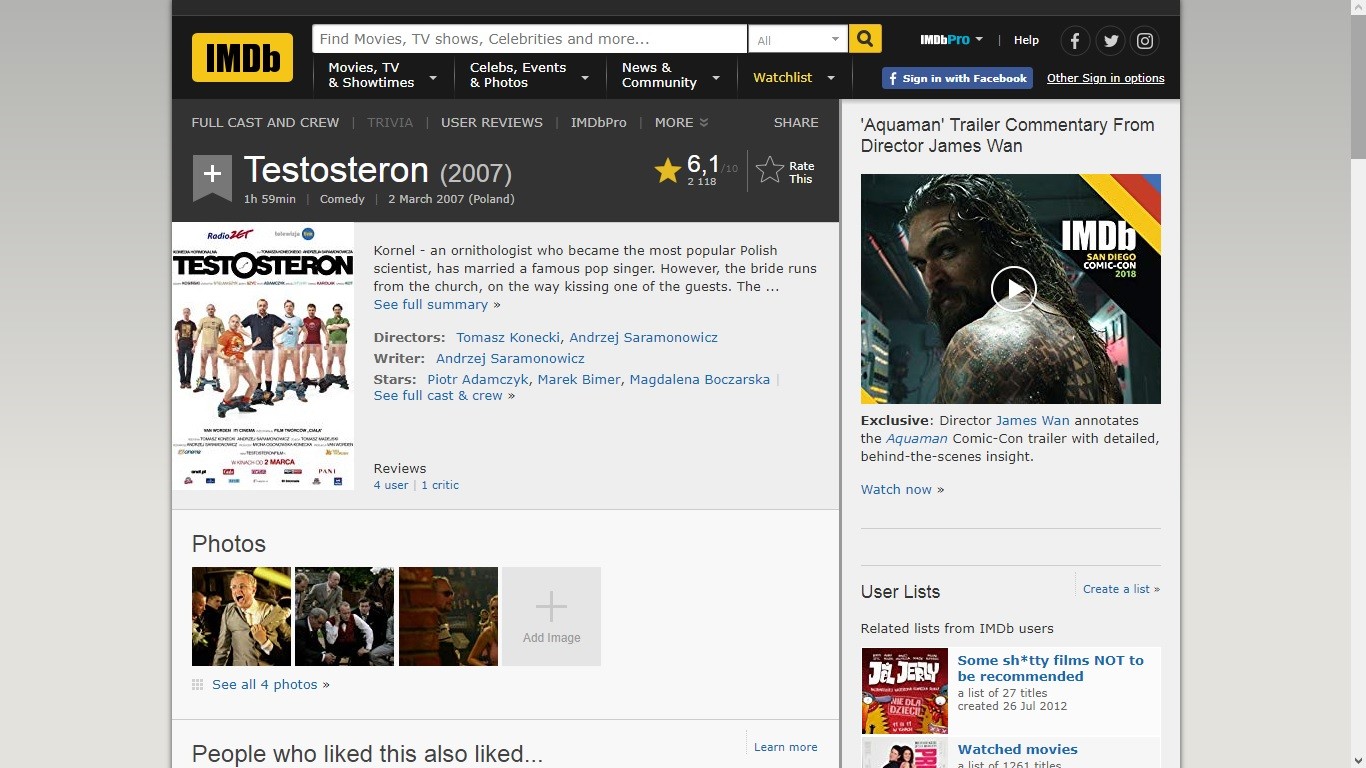
Comedy should never be taken too seriously, but this one in particular. As the title might suggest it is a comedy that focuses on a very male point of view regarding the world and women. The plot is build around seven guys and a wedding cancelled when the bride runs away from the altar. They are discussing the evergreen philosophical subjects of love, life and relationships, often developing interesting and really hilarious conclusions. Yes, they are rude, they are often obnoxious and misogynist, but that’s the whole point. Remember who really laughs last in Polish cinema.
Miś "The Tedy Bear" (1981, dir. Stanisław Bareja)
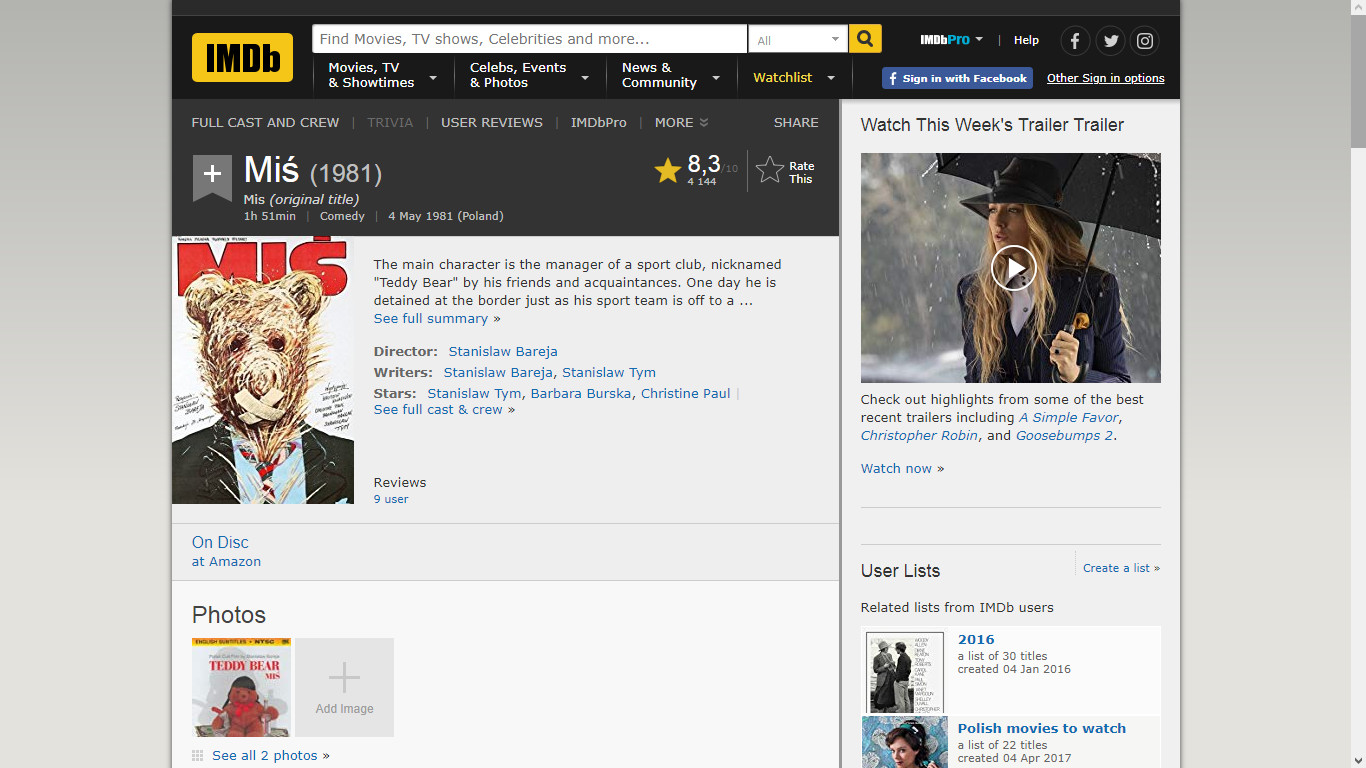
Probably the most legendary Polish comedy of all times. Written and directed by the grotesque genius Stanisław Bareja this film was produced in one of the most sombre times in Polish history of the second half of 20th century, a period known as ‘stan wojenny’ (martial law). It is well worth watching it with somebody who knows the context for most of the jokes and that could explain to you the hidden meanings behind each line of the film, the best if it is someone who lived in that period. I remember watching it with my parents and everything that at first didn’t seem funny at all, proved to be really witty once you know something about the reality of those times. Here again you don’t really sympathise with the main character, in fact you rightfully despise him, but then you can’t help not to admire his sly ways. Also, you don’t have to worry too much about the plot, focus rather on the grotesque of each scene. It might be a bit of a challenge, but you will be really glad to have watched it.
Hydrozagadka (1971, dir. Andrzej Kondriatuk)
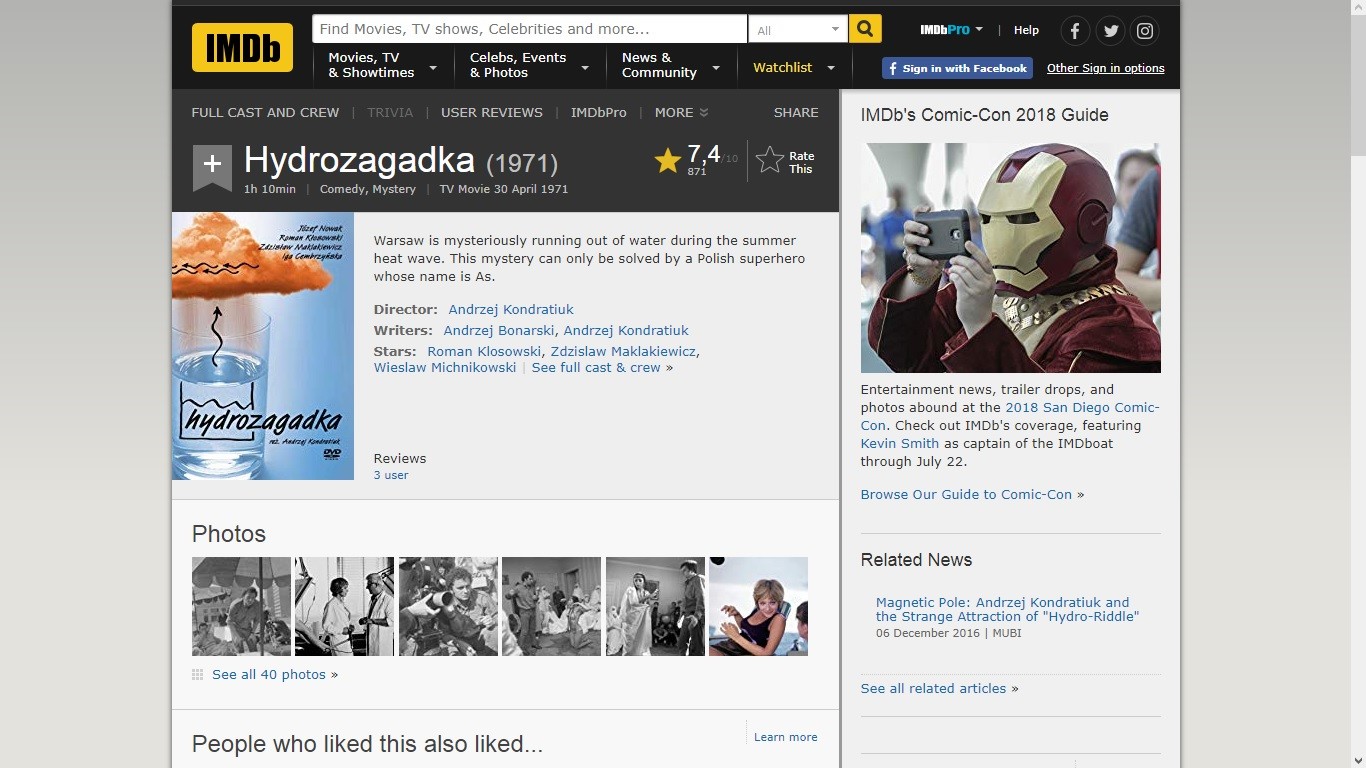
The only time in history Poland released a Superhero movie! Behold Marvel and DC! You stand no chance against AS! (that sounds bad doesn’t it? One more ‘s’ and it would be too much) Personally I adore this film for the uncanny grotesque they use. It is not for everyone, and some people might find it unfunny or simply stupid, but that’s the genius behind the ‘Hydrozagadka’. Not a single sentence can be taken seriously here, the dialogues and the plot are ironic to the point of confusing the viewer, and the cast does amazing job. This film mocked brilliantly the official propaganda of Polska Republika Ludowa (People’s Republic of Poland).
U Pana Boga w Ogródku (2007, dir. Jacek Bromski)
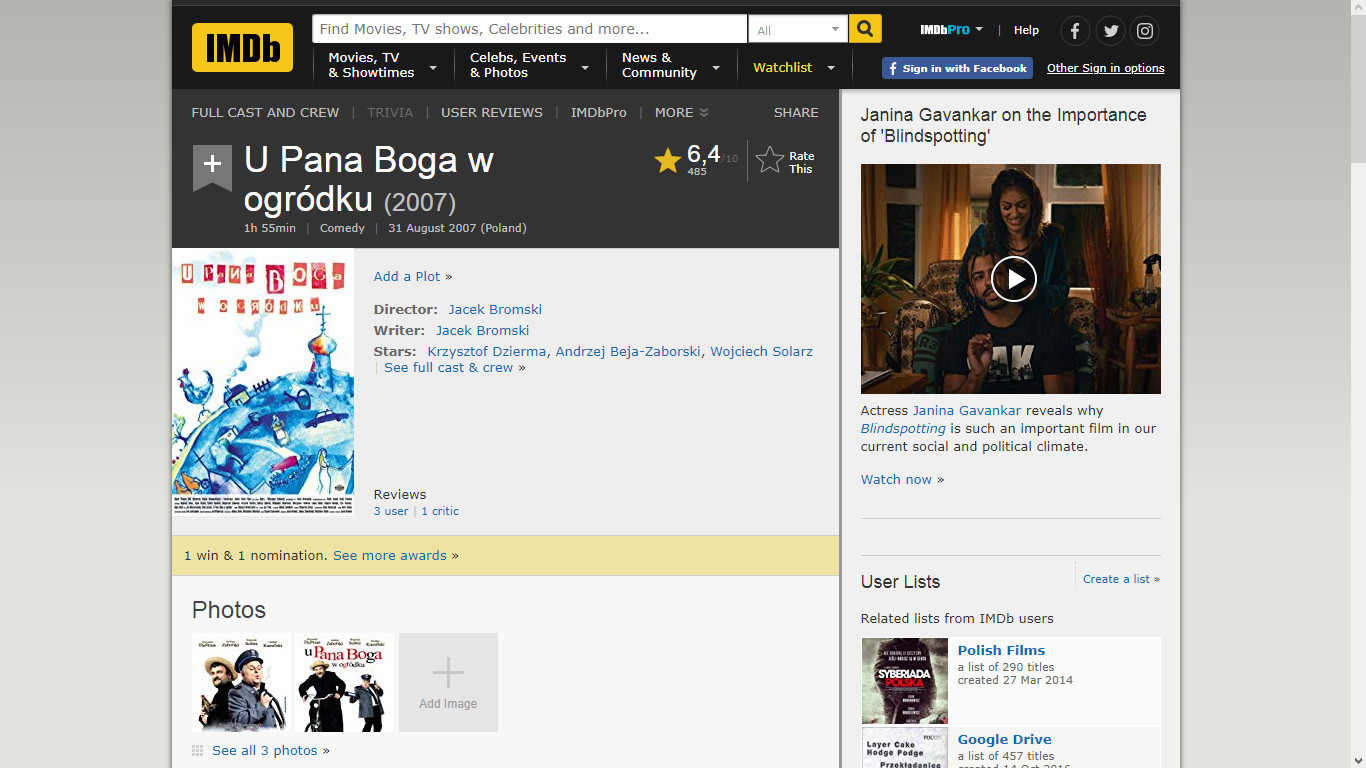
I must admit that there’s a fair chance that this film will not be too funny for non-native Polish people as most of the jokes revolve around the unique accent of the Podlasie region in Poland, but this is the very reason I want to mention it. It is a comedy about the Eastern Poland, a place truly different than the one I have always lived in. Especially around the Białowieża (a place where you can find a famous natural reserve forest with legendary żubr (bison), the same one you know from the ‘bison-grass vodka’ Żubrówka). The film depicts life in the province, and this film playfully toys the stereotypes about the Polish countryside.
Jak rozpętałem drugą wojnę światową "How I unleashed World Warr II" (1970, dir. Tadeusz Chmielewski)
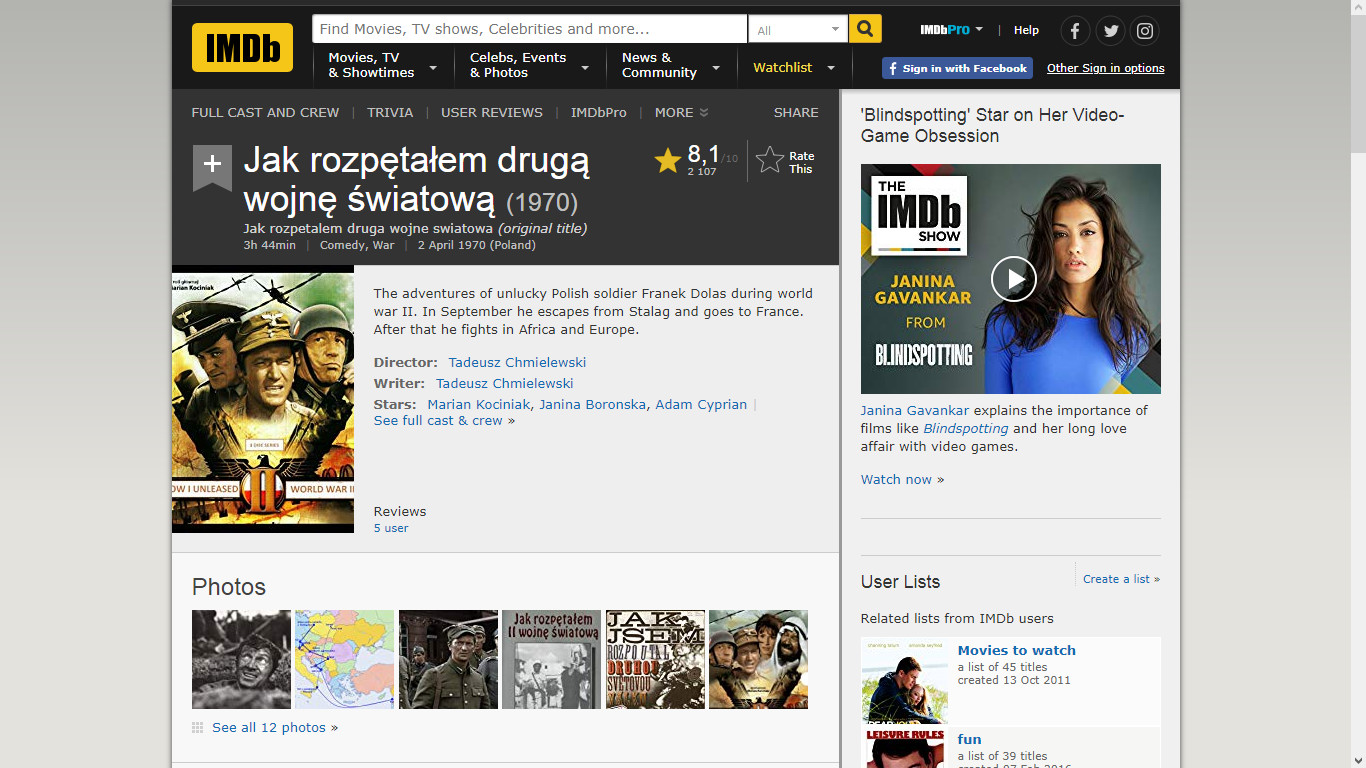
Another legendary position older than the author of this text. This is a film depicting the adventures of the swaddie Franek Dolas, who believes that he started the World War 2. I included it in the list mainly because of the memorable scene of interrogation, where Franek Dolas uses insanely difficult Polish expressions and sound clusters to infuriate the SS- officer. Overall the comedy is brilliant and somehow tickles the self-esteem of an average Polish person.
Seksmisja "Sexmission" (1984, dir. Juliusz Machulski)
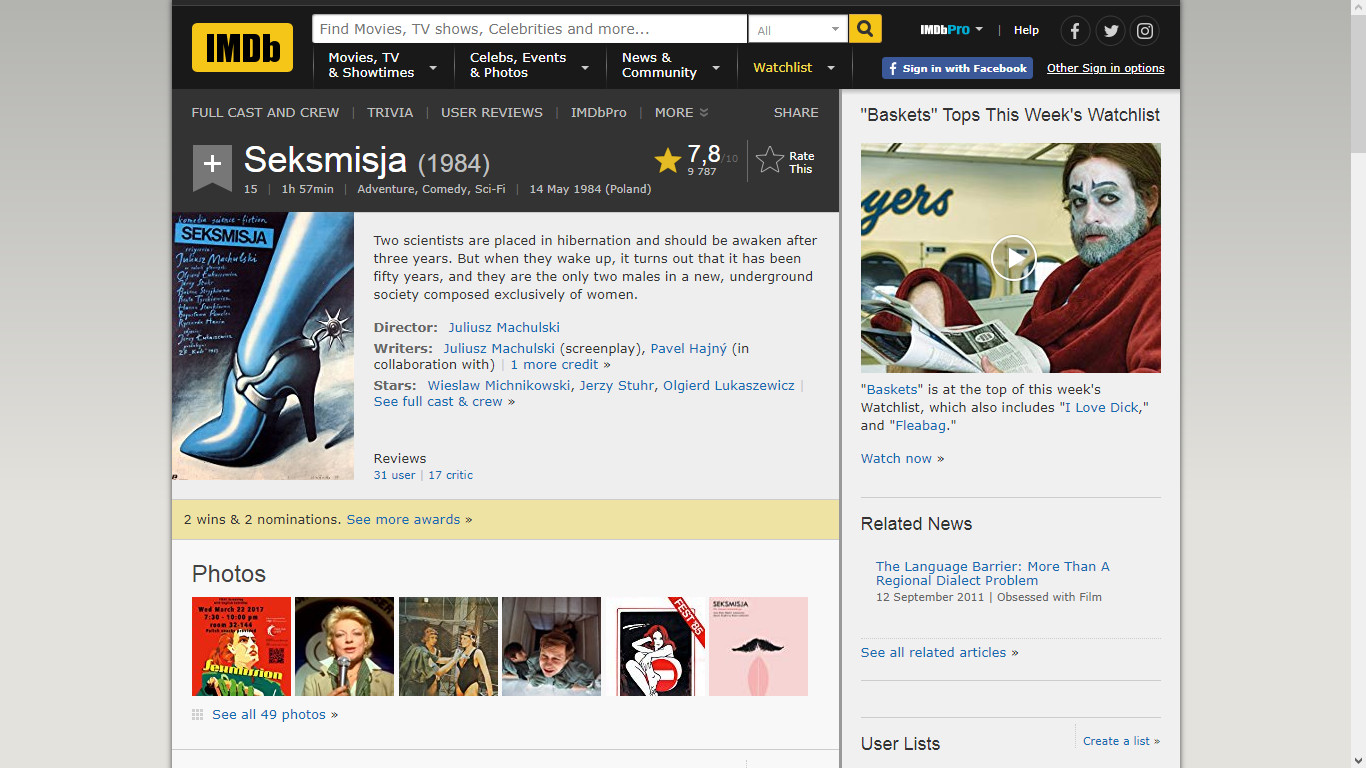
And yet again another ‘classic’ of Polish cinema and one of the very few local productions tackling the Sci-Fi ideas. This film was breaking for the director, two main actors and the Polish society as a whole. In the year 2044 two volunteers hibernated for 53 years are being awakened in the world run by a League of Women. It turns out they are the only males in the society, and it doesn’t put them in any privileged situation. Even though the story outline might seem shocking to many, it is worth remembering what’s the main idea behind Polish comedy and who is the real object and subject of the joke. Juliusz Machulski is one of the best Polish directors with a brilliant eye for social relationships, and one has to admire the bold nude scenes - a sign more of a bravery than a PR stunt.
War Films
You had to expect it. After all you’re coming to a country where every family has got at least one member who died during the Second World War. Many of them were killed in the infamous Nazi Death Camps, others died in no less horrible communist Gulags. So you can imagine how important this period is for the Polish society. That’s why you should expect some productions to touch the themes that impacted the country so severely. What may strike you is that there is far less heroism, pathos and cringy lines about dying here. Very often as a viewer you’ll be confronted with the disturbing images, brutal scenes and the overall sense of injustice radiating from these films. It won’t be easy, but it’s well worth your time.
Róża (2011, dir. Wojciech Smarzowski)
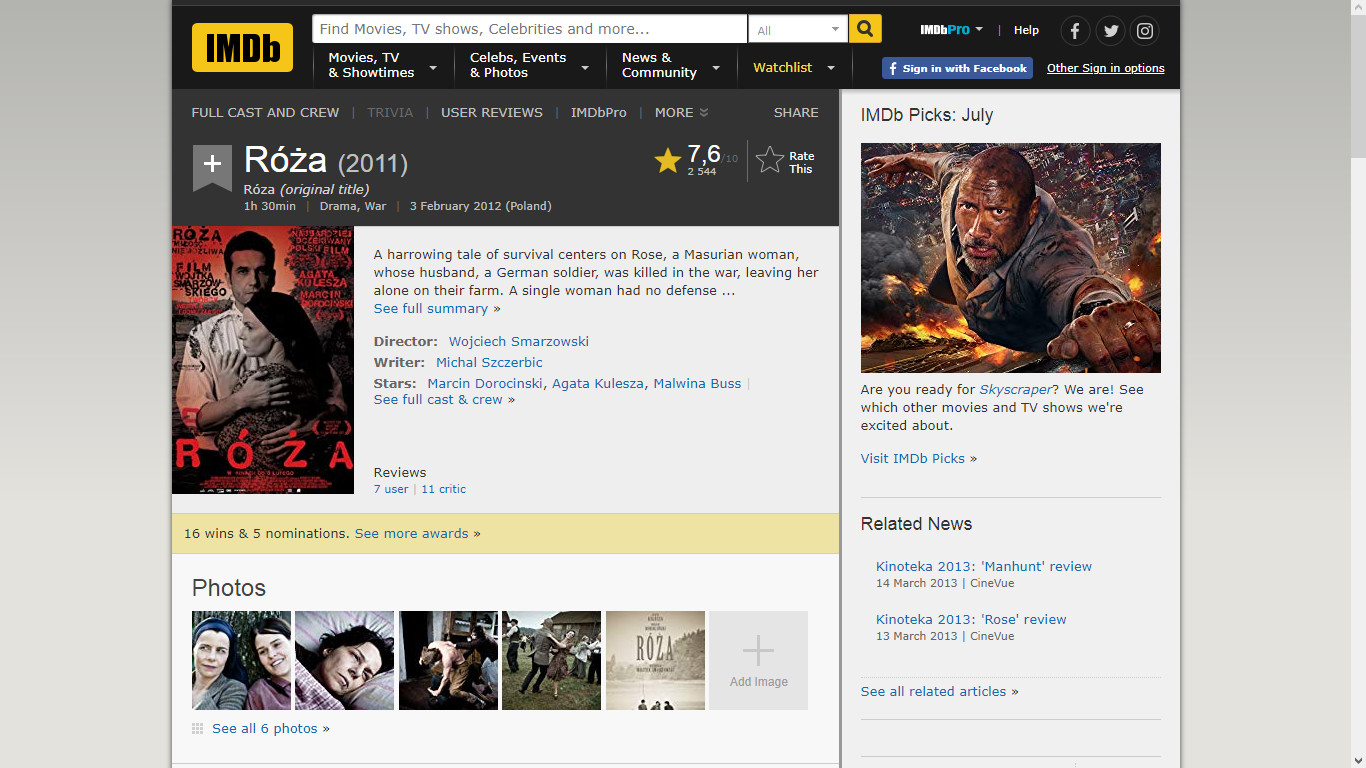
A really disturbing image painted by (in my opinion) one of the best Polish directors in history. Wojtek Smarzowski is quite well known for his uncompromising, often offensive and definitely brutal productions, but there is a one thing no one can argue with, his films are intriguing, brilliantly made and really impressive. Róża is exactly such a film. It shows how difficult this period was for everyone, and proves that even the end of the WWII wasn’t the end of the struggle.
Powstanie Warszawskie "Warsaw Uprising" (2014)
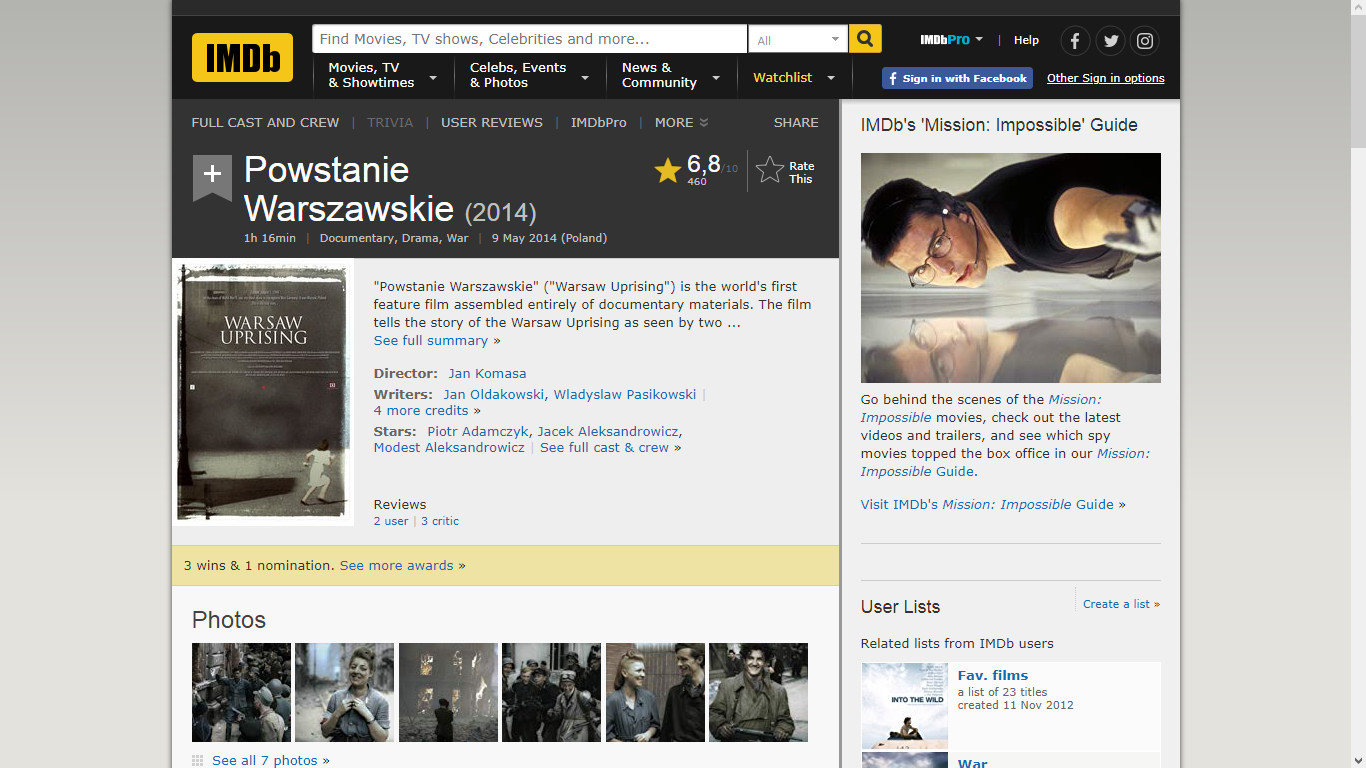
If you happen to be in Warsaw on 1st of August, at 5pm you’ll witness incredible and moving scenes. All life in the city comes to a halt, you’ll hear a sound of hooters, you might see tears in the eyes of many people around you. It is because they will be commemorating the Warsaw Uprising (Powstanie Warszawskie in Polish, hence the title). I think that seeing the museum dedicated to this event that took place in 1944 is a must when visiting Polish capital, otherwise you won’t understand (and then appreciate) its history. I also included this film in the list because it was made entirely out of the original materials shot by the chroniclers of the fight against German troops. I know that the dialogues might be slightly cringy or not in the right moment of the film, but the plot isn’t the main point of the production. It shows you the brutal reality of those days. When somebody dies on the screen - they died in reality. Every tear is real, every smile is a glimpse of authentic moments of joy from those sombre days. That’s why the film is truly unique.
Pianista "The Pianist" (2002, dir. Roman Polański)
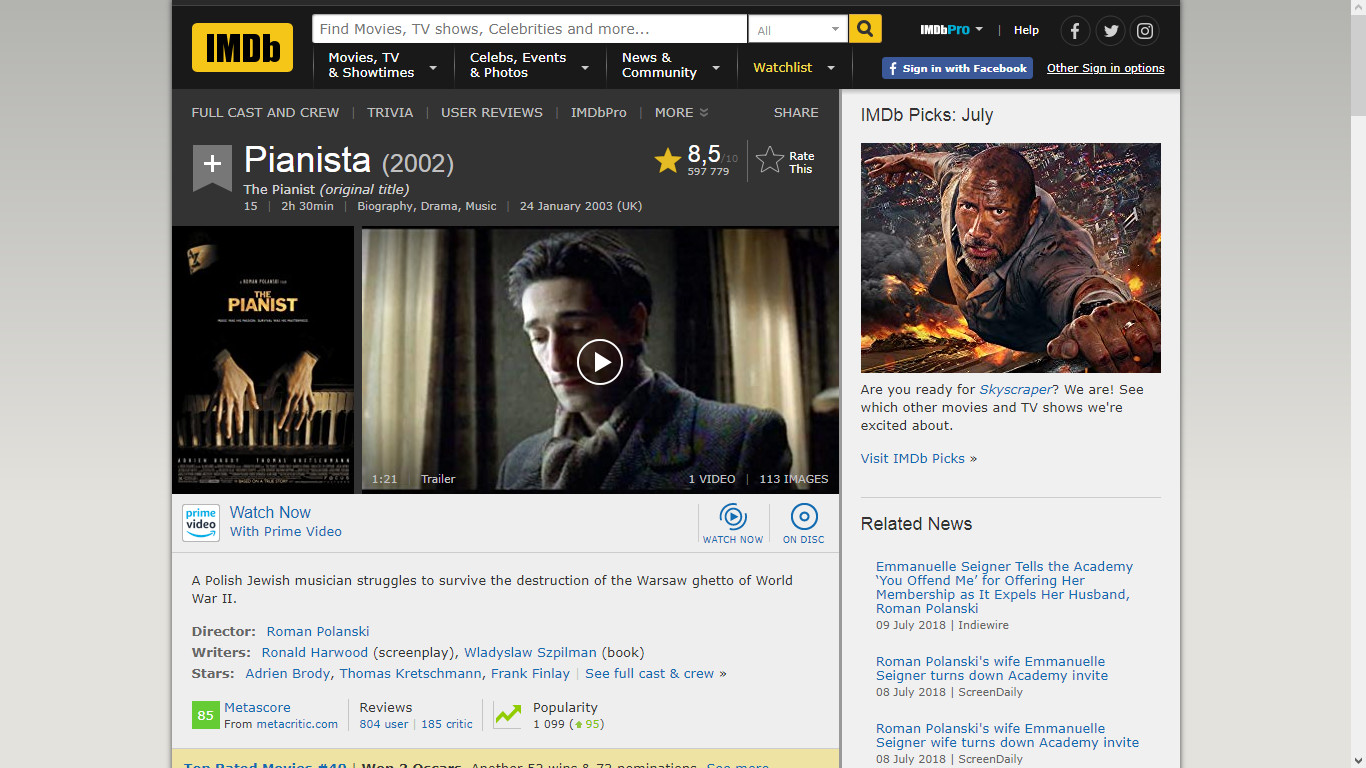
One of the most famous and critically acclaimed war films in history. It brought the director an Academy Award, and not without a reason. It is not technically a Polish production, but you’ll find loads of Polish actors starring in it, and Roman Polański is by all means Polish as well. Taking aside all of the controversy regarding the director it is worth mentioning that he is a Polish Jew who managed to escape from the Cracow’s ghetto. (A fact that one can’t stress enough - Jews who died during the Holocaust were also, if not primarily, Polish, Hungarian, French, German etc. citizens). The film tells the story of a brilliant pianist Władysław Szpilman and there is no way I could recommend it enough.
Katyń (2007, dir. Andrzej Wajda)
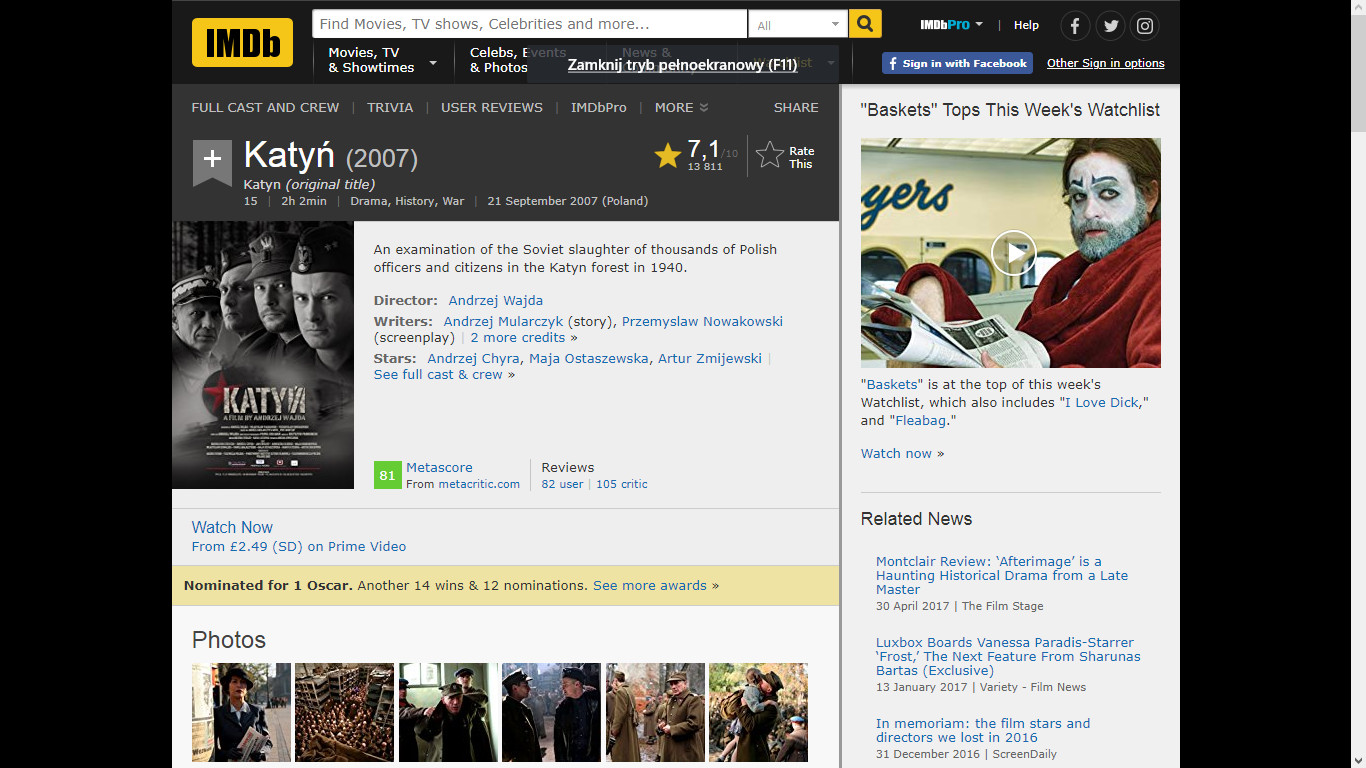
This is a film by yet another Polish Academy Award winner Mr. Andrzej Wajda. A film quite important for many in the society as it tells the story that for years was forbidden to be discussed in public. It was so because Katyń tells the story of Communist atrocities, where in 1940 Russian NKVD killed more than 20 000 Polish citizens by shooting them in the back of their heads after proclaiming them ‘enemies to Soviet Union’. It was forbidden to talk about the carnage of Polish officers that took place in the forests around Smolensk in Russia for more than 45 years. It was a very much clandestine knowledge. Regarding the film itself it is a really moving production with some bold and memorable scenes.
Wołyń (2016, dir. Wojciech Smarzowski)
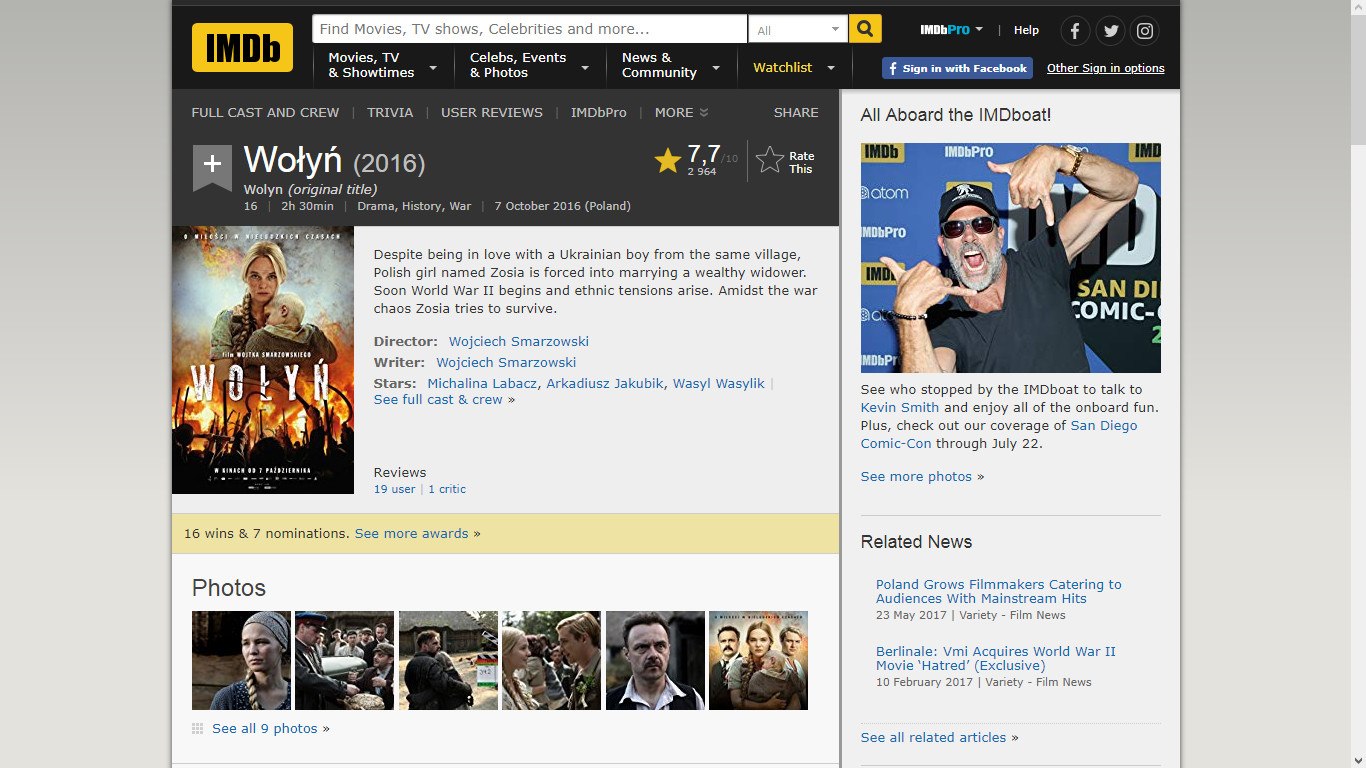
Another film by Smarzowski and this one, believe it or not, is by far the most brutal of all of his productions. It tells an important story though. It depicts events that took place in 1943. It was an ethnic purge where around 50 000 Poles were killed by Ukrainians. However, it does not merely limit itself to blatantly blame Ukrainians for the slaughter. It goes deeper into the subject. It shows the shameful attitude of Polish intelligence towards Ukrainians, something that doesn’t excuse the purge, but gives it a different perspective. As usual Smarzowski focused first of all on people, later on their nationalities and as a result you get a gripping story that will truly impress you.
Thrillers
They can be quite daunting, a bit dark and each of those I mentioned below try to tackle important social issues and historical reality of Poland. They show the struggles cause by alcohol, hidden and open hatred and the lies that impacted lives of many.
Dom Zły "The dark house" (2009, dir. Wojciech Smarzowski)
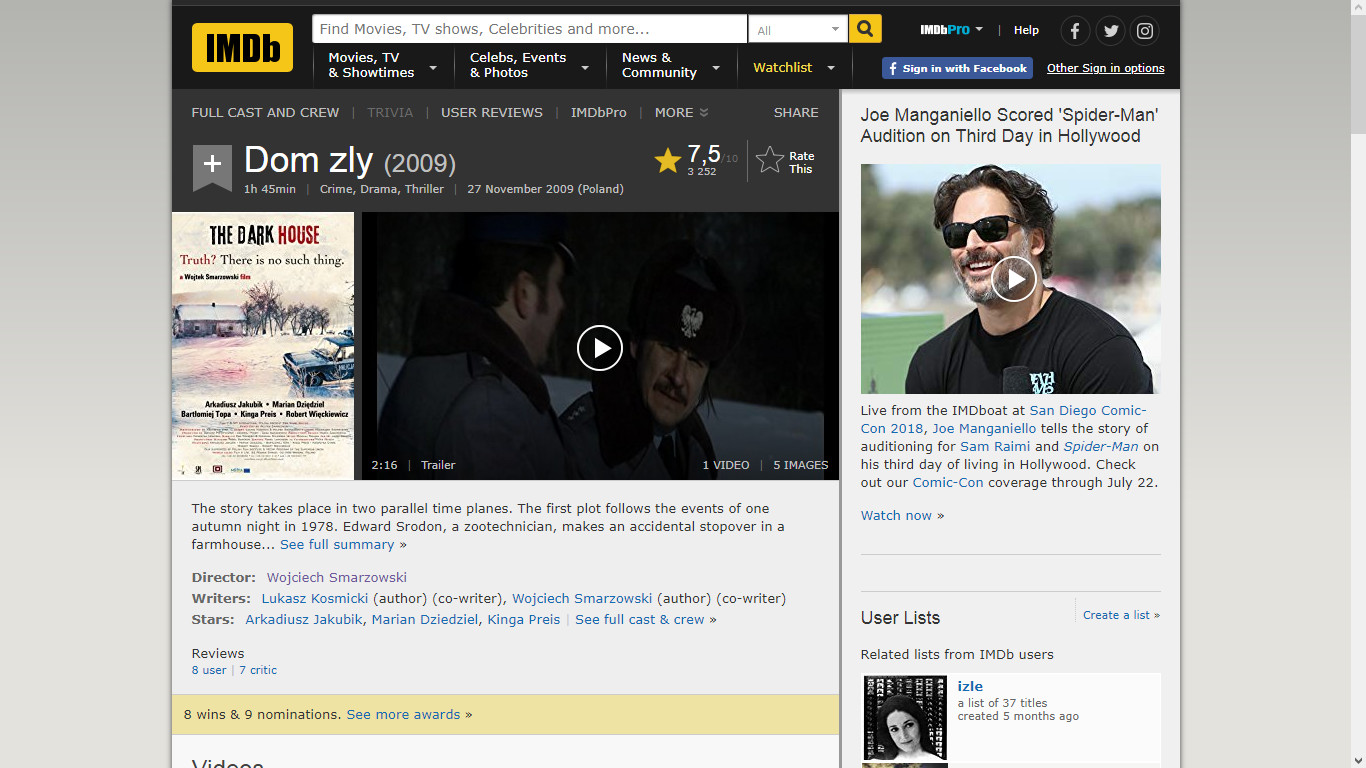
Another production by Wojtek Smarzowski and this one is really dark and sombre. It takes you back to the communist Poland where in one of the villages a gruesome murder has taken place. Detective Mróz who runs the case realises that unveiling the truth might be really dangerous. Great cinema.
Pokłosie "Aftermath" (2012, dir. Władysław Pasikowski)
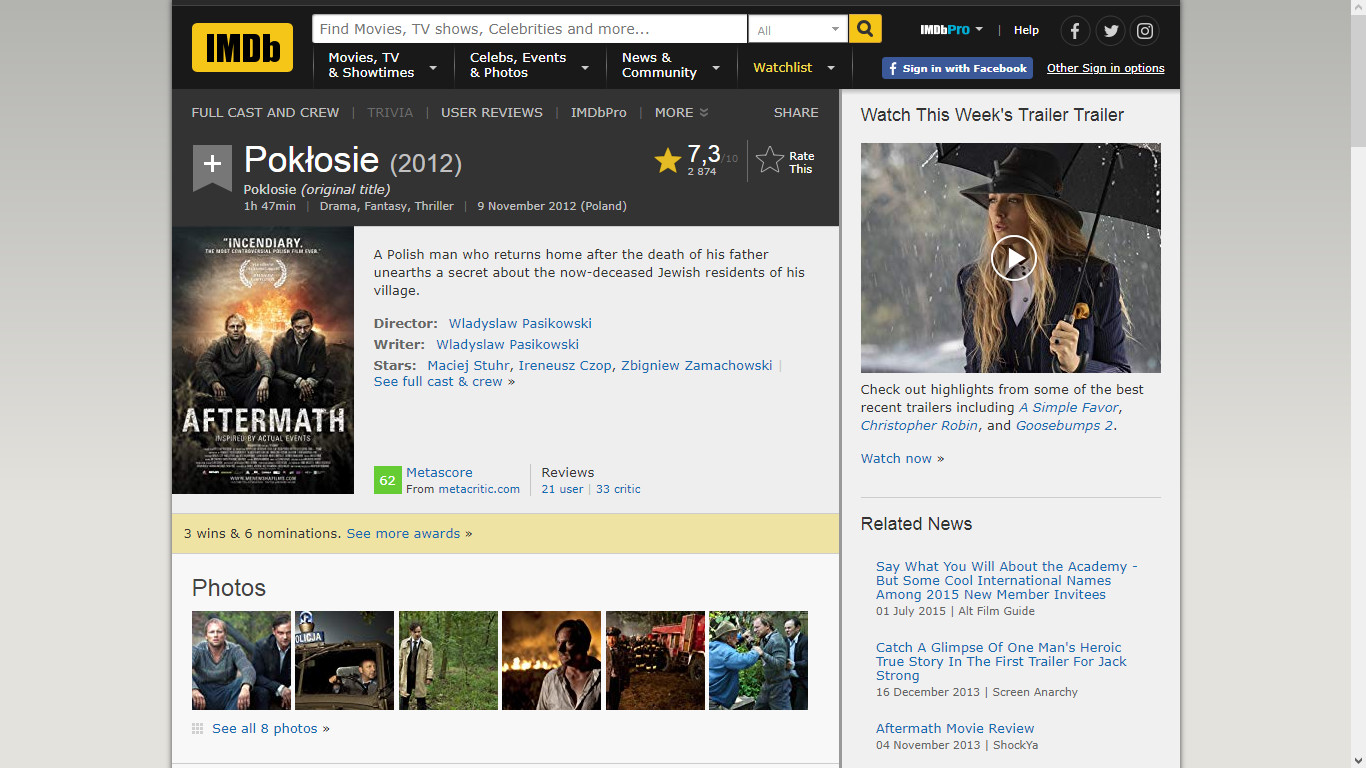
Probably the most hated film in the history of Polish cinema. Not because it’s any bad, in fact this is a brilliant cliffhanger with the atmosphere of mystery and suspense from the first to the last minute of the movie. But it was massively criticised, called offensive and blasphemous, the actors and the staff have received numerous death threats when making the film and to this day many people cringe (to say the least) when you mention its title. Some will openly attack you because of that. It is so because it is a film that depicted the tragedy and the horrendous mass murder of Jews by Poles during the Second World War. Some people felt robbed of their national identity, because they had grown up in the reality where every Pole was a hero of the WWII. Some people say it is a part of global, Jewish-lead propaganda aimed to smear whole Polish nation. To me it is an important film. It does not negate all the deeds of the Polish heroes of that time (like Elżbieta Zawacka, Jan Nowak-Jeziorański, Marek Edelman or Maksymilian Kolbe to name only few) who were one of the greatest people walking the face of earth. Then you had normal citizens who just were unlucky enough to live in the times of war, where one of the biggest numbers of victims was registered in this country. However it is important that people are different and Poles are no exception. You’ll find the most lovely and the most unworthy of people everywhere. And this film shows that the heroism by no means can be appropriated.
IDA (2013, dir. Paweł Pawlikowski)
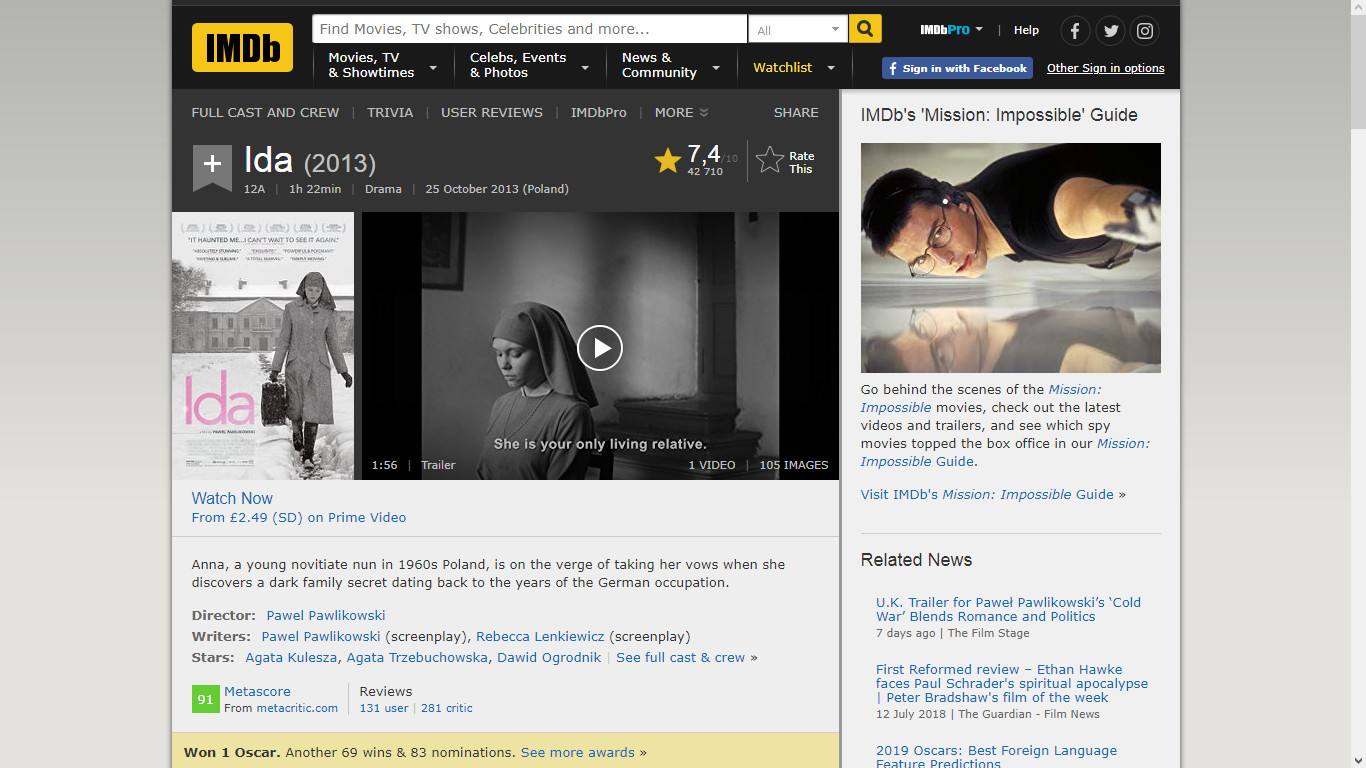
Yet again, another Academy Award winner Paweł Pawlikowski presents you with another acclaimed (and despised by some of the Polish extremist) films. Even though this production touches some difficult subjects likePokłosie, it is less accusing, it focuses on the emptiness that was left in Polish culture after the Holocaust. However, one of the main characters was inspired by a stalinist prosecutor who took part in the staged investigations against some of the Polish national heroes, and till the very last years of her life she was not brought to justice for her actions in the communist era. Nevertheless, this part has got very little to do with a film. It shows the real struggle and pain that came after the war.
Horrors
To be honest there aren’t many productions in Polish cinema that are horrors. In fact over the last fifty years I know of less than ten productions described as horror films. And to be honest they weren’t really any good.
DEMON (2015, dir. Marcin Wrona)
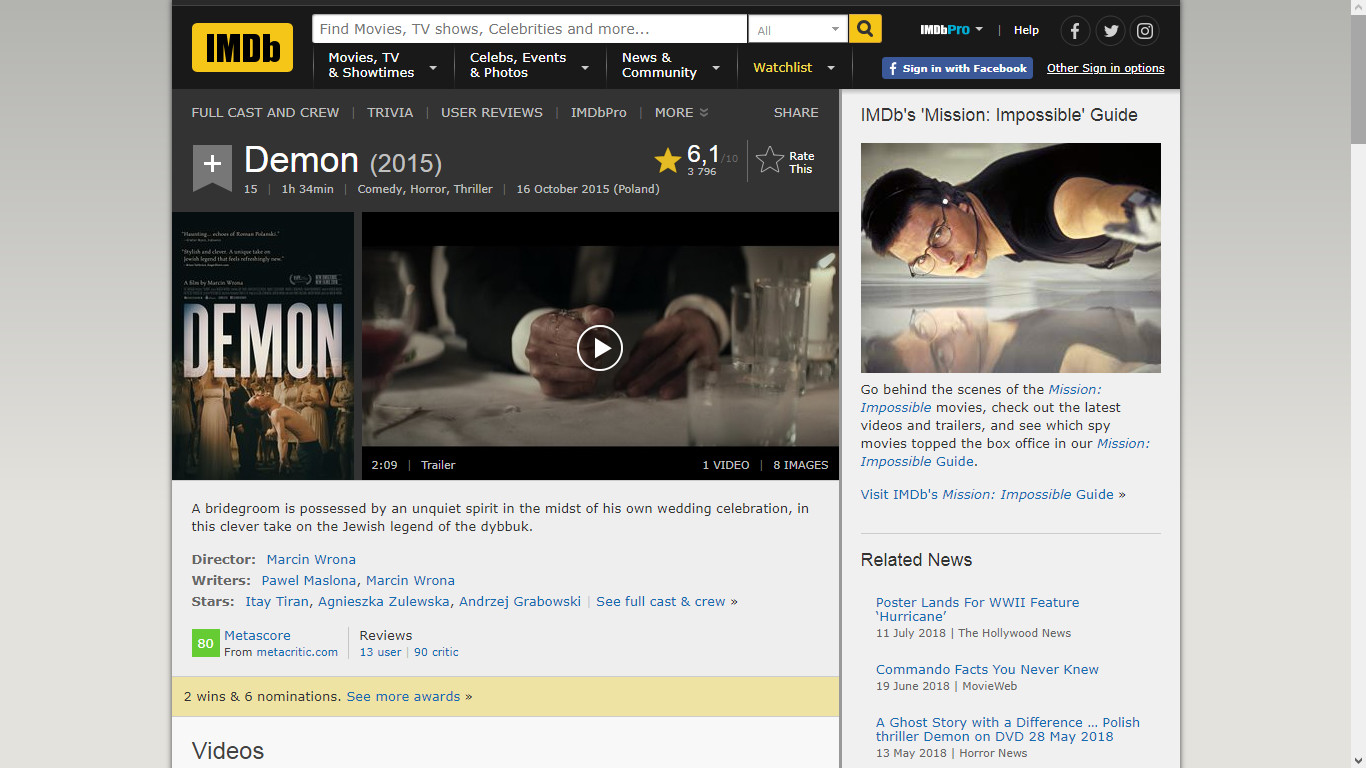
This is one exception and a film I really enjoyed watching. It depicts the wedding of Peter and Żaneta, that turns out to go...unexpected. There is a good sense of humor alongside the suspense and some scary scenes. I can’t say much more not to spoil it. Sadly the director committed suicide shortly before its premiere.
ROMANTIC COMEDIES
Probably the most popular film genre in Polish cinema. Sadly, most of them are between bad to...ok. They’re not really my cup of tea on normal days. But every now and then I do like some ‘love story’ to watch. If you really want to watch a typical romantic comedy go for ‘Och Karol 2’ where you are bound to see loads of attractive women and the not-so-attractive, but probably a really nice person and actor Piotr Adamczyk.
Rewers "The reverse" (2009, dir. Borys Lankosz)
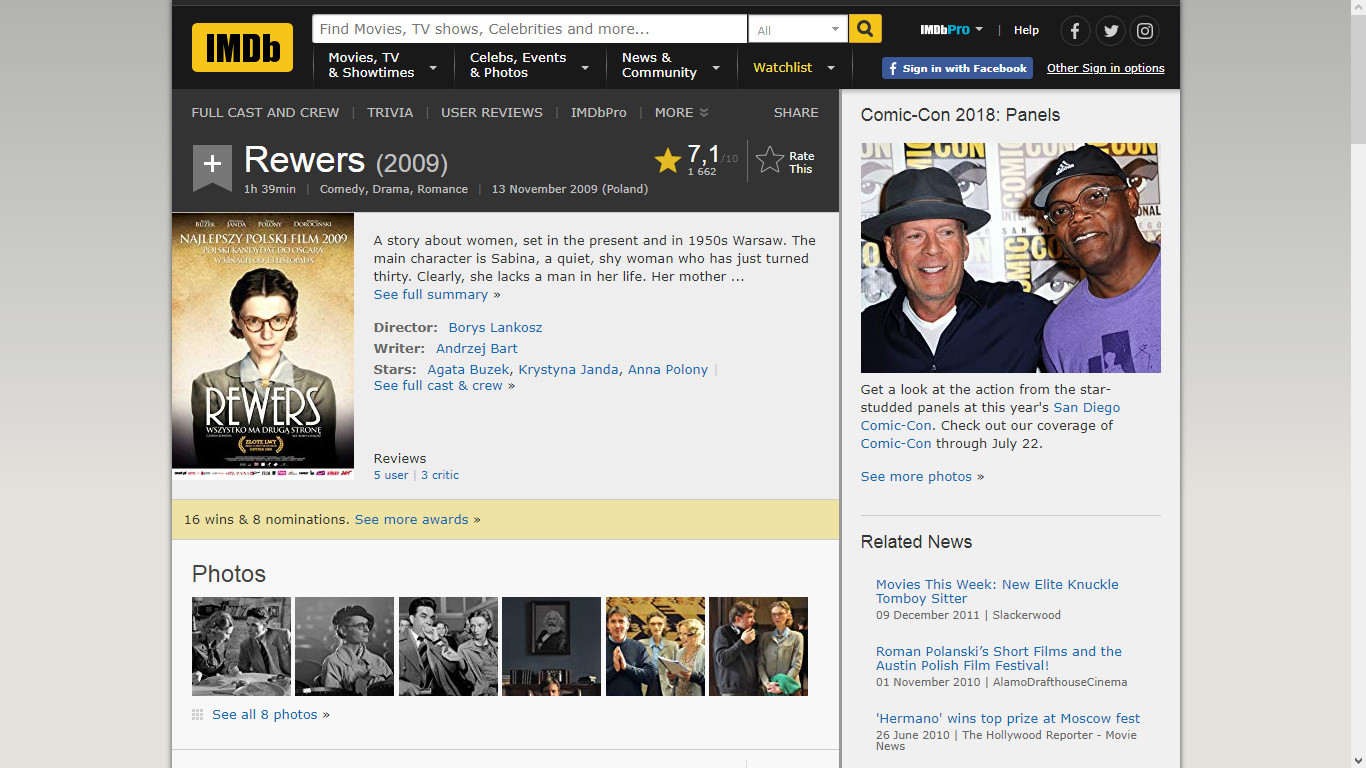
On the other hand I definitely recommend Rewers. A brilliant and not-so-predictable love story set in 1950s. It’s black and white and the shots are stunningly beautiful. The cast are brilliant, and from time to time the director winks to viewers by some really good humour and little tributes to the classics of world cinema.
Wszystko co kocham "All that I love" (2009, dir. Jacek Borcuch)
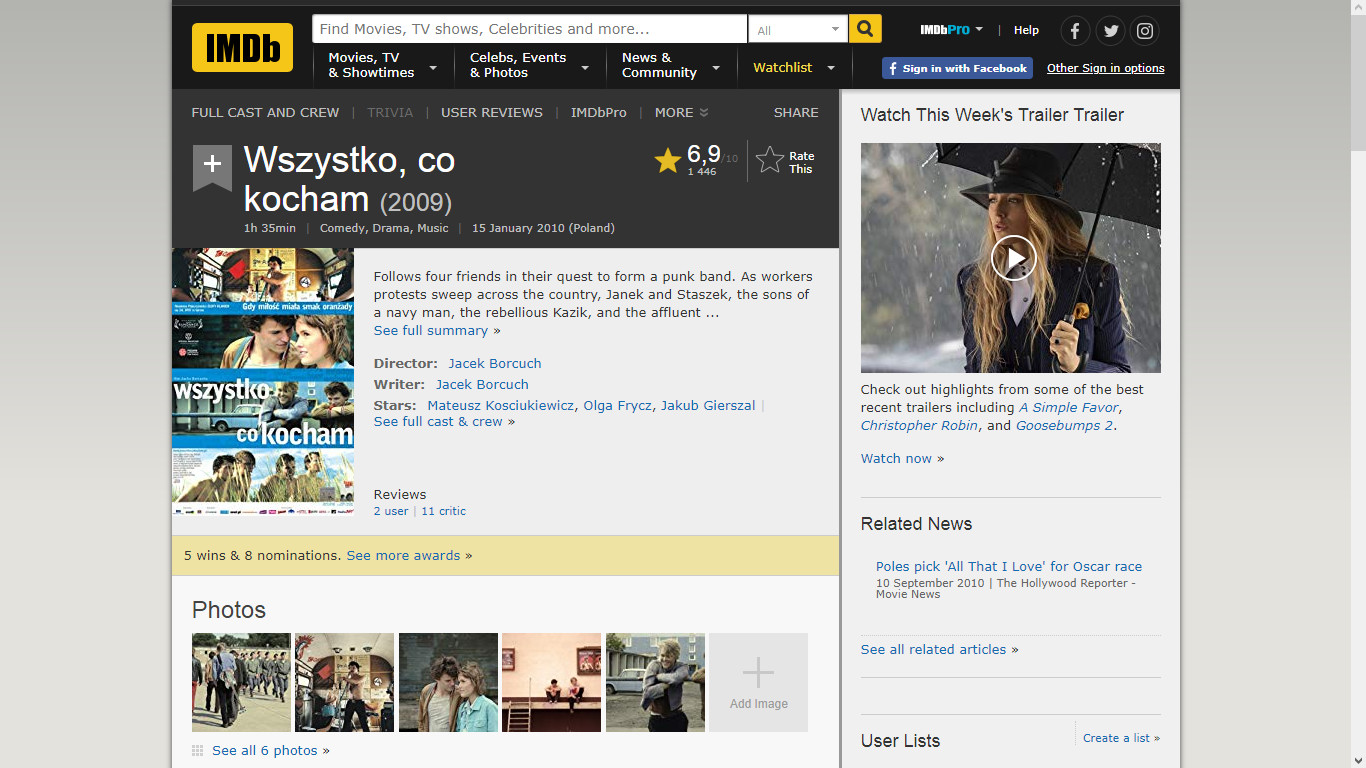
Not a romantic comedy as such, but a brilliant teen film, and the relationships do pay an important role in it. It is also a film about a love for music and punk rock in particular. It is a film about being a rebel. It is a film also about a frustration caused by the previous system that was established in Poland. A great watch and it helps you understand the generation of our parents.
NOT SO EASY TO WATCH BUT WORTH IT
Polish cinema will be very much a European cinema, which means the most acclaimed films won’t be this easy to watch, but will be well worth of your time. They talk about different, but important issues, they are very often made in a very specific or non-conventional way, but they will be definitely stuck in your head for long.
Chce się żyć (2013, dir. Maciej Pieprzyca)
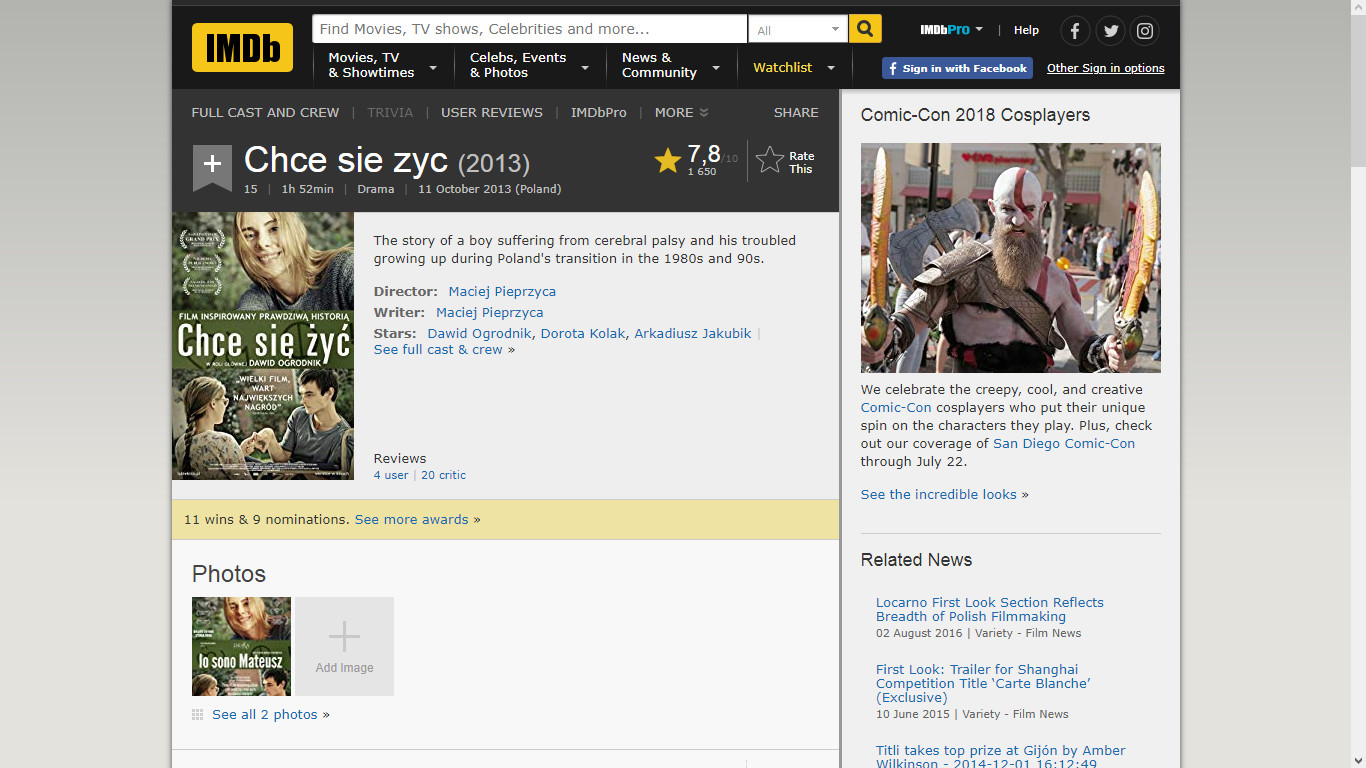
A really moving picture telling the story of a paralysed kid who wants to live a normal life. I know it sounds like a cliche, but by no means this film is any cliche. There is no fake sympathy, no patronising. It is a truly honest and real approach to a disability. Dawid Ogrodnik’s role in this movie is beyond amazing.
Dzień Świra "The day of wacko" (2002, Marek Koterski)
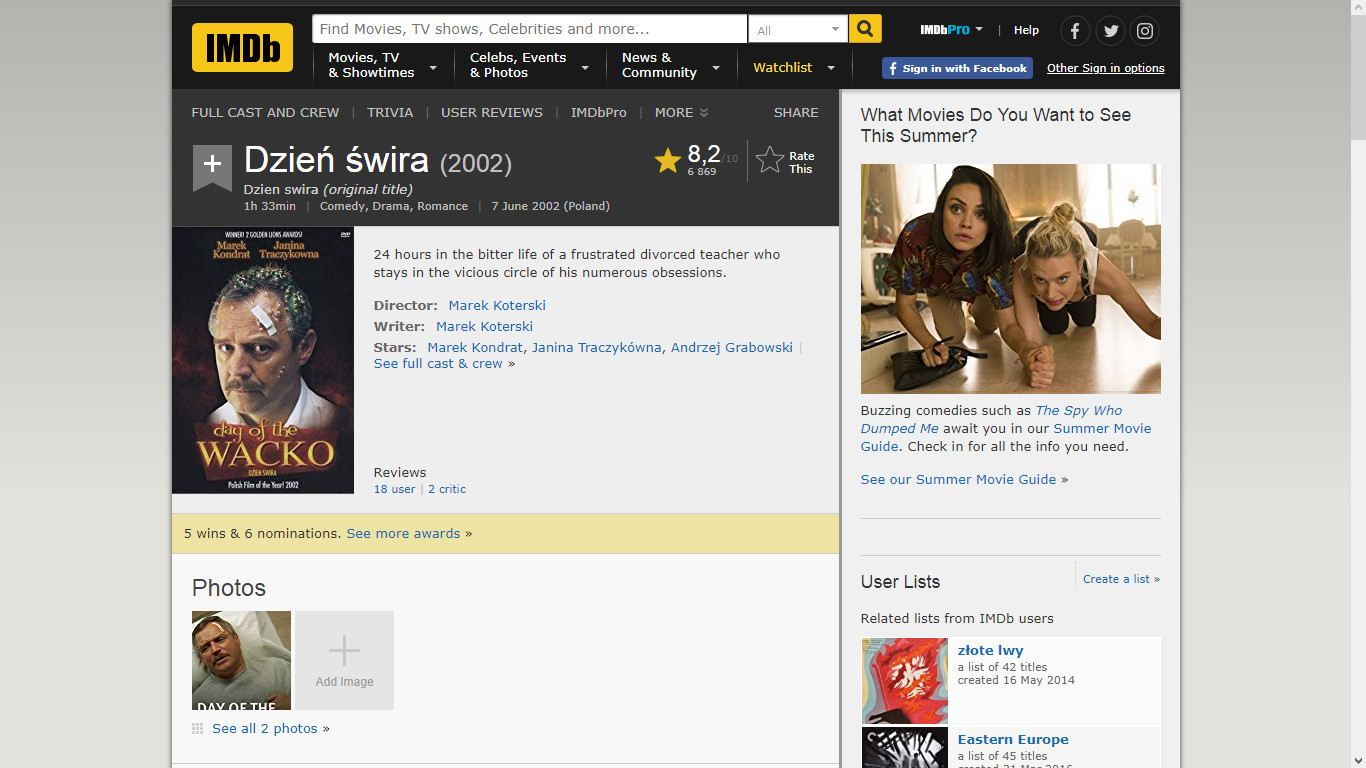
One of the most legendary Polish films and one of the saddest, most cynical and depressing productions I’ve seen in my entire life. A picture of a hypochondriac, mean, and bitter teacher with OCD and the way he passes each day, slowly sliding into madness. Even though the film might seem a bit down bringing it is a great cinema work with an extraordinary role by Marek Kondrat.
Bogowie "Gods" (2014, dir. Łukasz Palkowski)
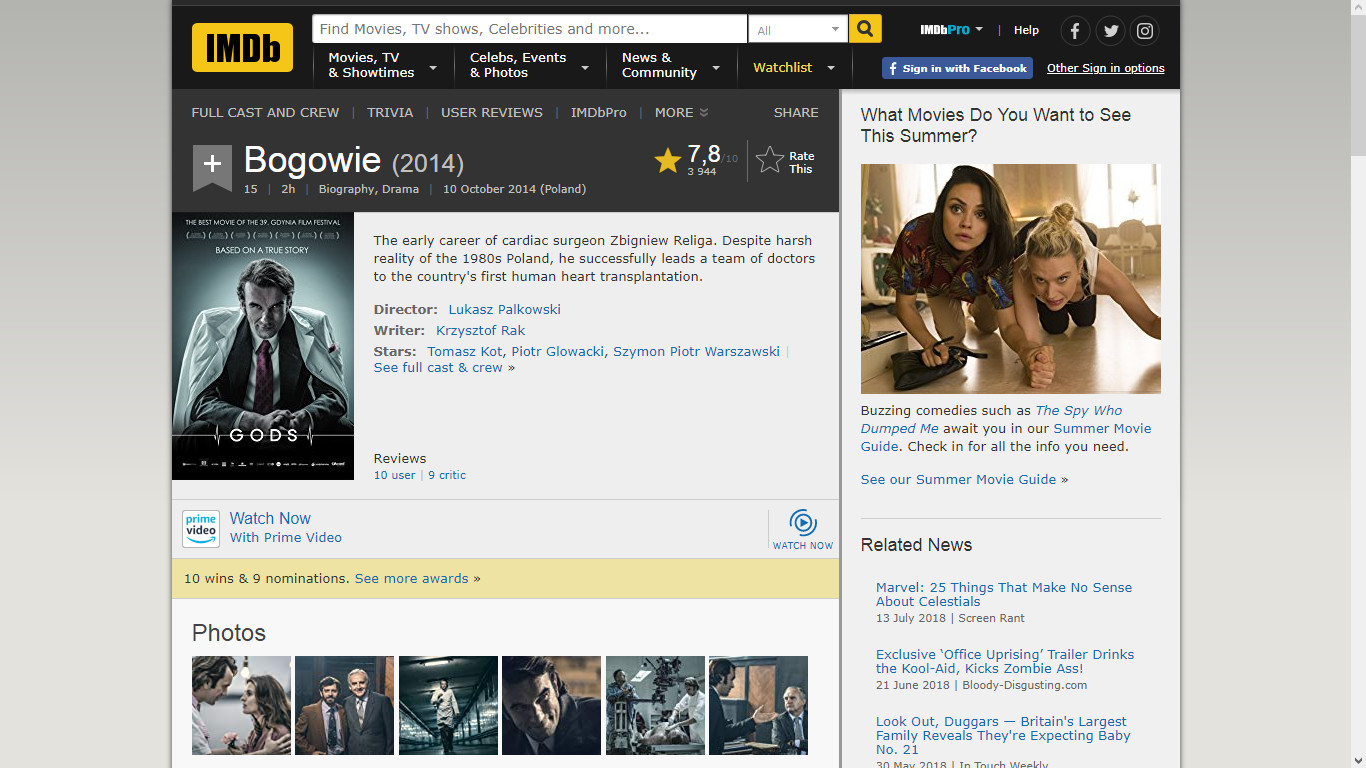
A tremendous film telling a story of one of the modern day superheroes - profesor Zbigniew Religa and the incredible determination behind the first heart transplant in Polish history. With a magnificent role starred by one of the best Polish actors Tomasz Kot and a great screenplay this is one of my favourite Polish films. There are no excuses, no filtre for the reality, it shows the hard work and the gigantic price paid for something more than passion - a calling.
Animacja
Poland has got a great history when it comes to animation, especially when you think of the Se-ma-for studio from Łódź, producers of many legendary productions, especially for children. I know there are many brilliant modern studios that released great films recently, however not having personally seen them I don’t want to misguide anyone. There is one guy I’d like to mention though.
Tomasz Bagiński
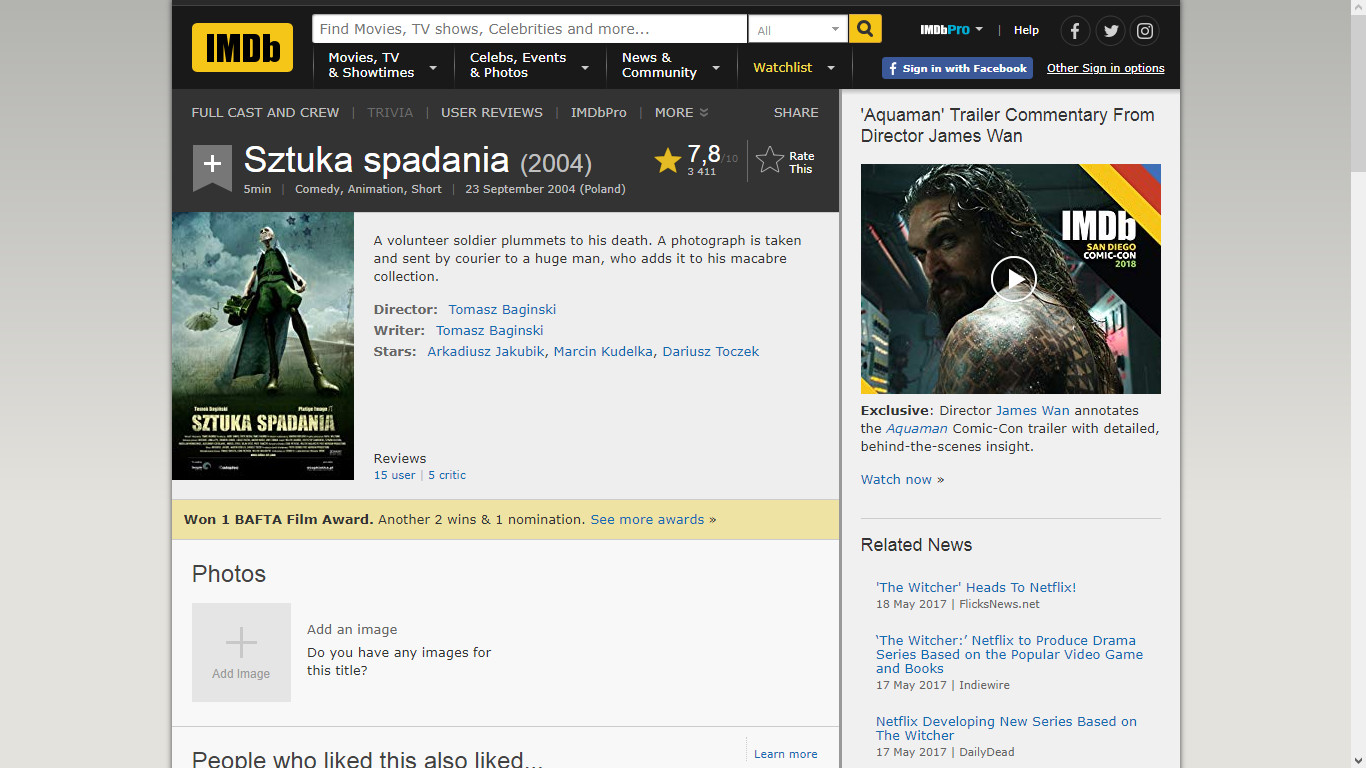
One of the most acclaimed Polish illustrators is also an animator and a director. What’s interesting he is a self-taught artist. He’s got an incredible visual imagination, which was appreciated by the international public. I love all of his works, including the acclaimed Cathedral. Many people might know him from the famous The Witcher game. I would personally recommend his take on traditional Polish legends that you can find on YouTube.
*Disclaimer*
By no means this list is exhausting, and even amongst my friends there are those who have seen and could recommend some other films. These are the ones I personally find worth watching and would recommend it on blog as well as in a normal conversation.
Photo gallery
Want to have your own Erasmus blog?
If you are experiencing living abroad, you're an avid traveller or want to promote the city where you live... create your own blog and share your adventures!
I want to create my Erasmus blog! →




































Comments (0 comments)